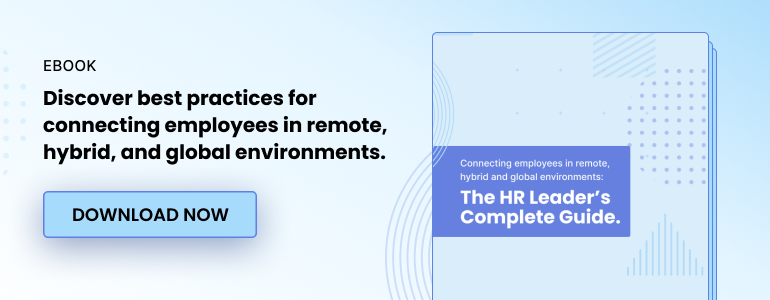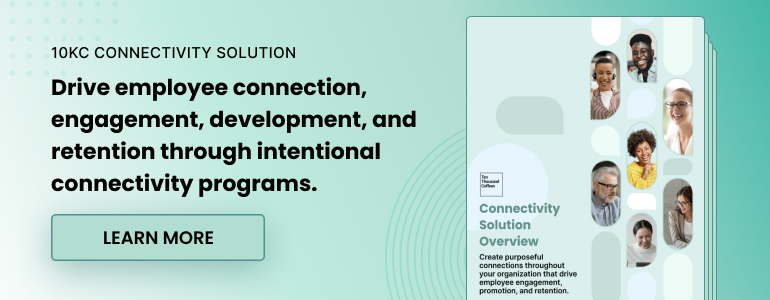Networking: it’s something people either love or hate. But the reality is that networking in the workplace is a vital part of employee and business success.
Despite the value of networking, organizations have struggled to keep employees connected. Since 2019 alone, employee networks have shrunk by 16%. Sure, we can put a little bit of blame on the COVID-19 pandemic, but there’s certainly more that companies can do to help expand employee networks.
Keep reading as we discuss the importance of networking in the workplace, how to foster connectivity, and some tips to help employees fall in love with networking.
The importance of networking in the workplace
Networking is the process of individuals building relationships with other employees within their organization. This can include anyone from their peers, employees in other departments, or even senior leaders.
Networking is valuable as it:
- Creates new opportunities for employees: Networking increases employee visibility within the organization, opening up professional opportunities for employees that may otherwise not be available to them.
- Fosters innovation and creativity: Robust networks allow employees to share ideas and exchange insights with other teams, improving decision-making and creativity.
- Promotes collaboration: Employees who are comfortable with and connected to their peers are more likely to work well together.
- Reduces employee turnover: A sense of belonging can increase employee retention by as much as 34%.
“We hear very often that, particularly in the last few years, people have been working in silos. And they want to break free of those silos and really gain those cross-functional connections. Networking plays a big piece in that.” - Denise Pereira, Director of Customer Success, 10KC
Common barriers to employee connection
Connection and working relationships are naturally formed as employees go about their normal work. But not all networks are created organically.
In fact, in the modern workplace, teams and employees can face challenges that prevent employees from connecting with one another.
1. Workplace anxiety
Workplace anxiety is more common than most of us might think. And it can be caused by anything from employee burnout to things happening in an employee’s personal life.
When employees are dealing with anxiety at work, it can impact not only their performance but their willingness to speak out and engage with their peers. Over time, this shrinks their networks—which can contribute even further to their workplace anxiety.
2. Fear of reaching out
Reaching out to someone new can feel incredibly daunting. And in a world where employment can sometimes feel pretty precarious, it’s not entirely surprising that employees find it difficult to reach out to others in the workplace.
This is particularly true when it comes to networking for professional growth.
For example, having a conversation with an executive about their dog is still a form of connection—and an important one. But it’s much simpler than reaching out and asking them to be your mentor.
It’s easy for employees to feel like they’re inconveniencing the other person, which can prevent them from proactively building their networks.
3. Lack of time or opportunity
It’s a well-known fact that we need to make time for the people who matter in our lives—like our friends, our families, and our partners. While professional relationships might look a bit different, the same concept holds true.
Lack of networking and connectivity within organizations is often a result of employees—and the company—putting relationships on the back burner. It’s easy to get lost in the grind of work and performance and forget to make time for those professional relationships.
4. Challenges of hybrid or remote work
We’ve all had time to adapt to virtual working arrangements. And while remote and hybrid work environments come with many benefits, they still don’t perfectly replicate the connections that come with traditional in-person offices.
In fact, 65% of workers report feeling less connected to their coworkers in a hybrid environment.
It’s not that virtual connection is impossible, it’s that it requires a bit more commitment and effort. Virtual organizations need to create systems that help replicate those organic water cooler conversations.
The same barriers are often found in global teams where many interactions are virtual, and regular in-person networking opportunities—formal or informal—aren’t always readily available.

How to make employees feel comfortable at work
In order for employees to feel confident building their networks, they need to feel comfortable being vulnerable and taking risks.
Here are a few ways to encourage connectivity by making employees feel more comfortable at work.
1. Foster a space of psychological safety
Psychological safety is when employees feel confident being who they are and openly sharing ideas in the workplace. Ultimately, maintaining their employment and growing their careers is a top priority for employees. So, when they don’t feel safe in their roles, they’re more likely to keep their heads down and stick to what feels comfortable.
This often prevents employees from taking steps toward building the connections they need to truly succeed.
2. Make cross-department or cross-level connections the norm
It’s easy for employees to make connections with their immediate team. They likely have daily interactions, which ultimately grows that relationship. But employee networks shouldn’t be limited to the people they work with every day.
Employees should feel comfortable reaching out and connecting with employees in other departments. There’s often a perception that employees should ‘stay in their lanes’ but the truth is that those lines of communication between departments aren’t just good for human connection—but good for business.
The same goes for cross-level connections. These can feel extra tricky because there’s an undeniable power dynamic at play. Junior and mid-level employees often struggle to build relationships and connections with senior leaders. It’s not that senior leaders aren’t friendly or welcoming, but it can be intimidating because those individuals hold influential roles within the organization.
Diverse and underrepresented talent in particular often lack the confidence to reach out to senior leaders.
Open-door policies and creating formal opportunities to connect senior leaders can go a long way in creating a culture where those types of networks are not only normal but encouraged.
3. Put intentional networking opportunities in place
We love water cooler conversations and impromptu meetings in the halls. But you shouldn’t leave employee networking up to chance.
Companies should be creating ways for employees to connect with each other—especially between individuals who may never speak to one another throughout their work day.
For example, mentorship and sponsorship are great ways to increase the visibility of employees while creating diverse networks. Small group sessions, like 10KC Office Hours, are another great way to create opportunities for employees to connect with senior executives, without the time commitment.
By intentionally creating these opportunities, you also provide equitable access for everyone so no one gets left behind.
“In every aspect of the way we live our lives as human beings, we want to belong. And the easier we make it for individuals to feel themselves as part of something, the more likely it is for those people to stay, to grow and develop in that environment. [...] So reducing those barriers to belonging is so key. And the way you create belonging is through relationship.” - David Simmonds, SVP, Global Chief Communications and Sustainability Officer, Canada Life
4. Give employees the confidence to connect
Conversation and connection don’t come naturally to everyone—and that’s okay. But everyone should have access to the networks they need to thrive in their careers.
People managers and talent teams should take steps to help employees develop the skills and confidence they need to create connections with their peers. For example, structured curriculums and discussion guides can keep conversations flowing and give employees something meaningful to talk about.
It’s also helpful to provide tips and toolkits to help employees better navigate meeting new people.

5 tips to help employees overcome the fear of meeting new people
Meeting new people can be tricky for employees and can be a barrier to building networks. Here are some tips you can share with employees to help them improve their professional connection skills.
1. Conversations aren’t all about you
Many introverted folks have a habit of overthinking the other person’s behavior and responses. They’re constantly analyzing and assuming another person’s behavior is due to their own actions, creating a sense of fear.
But the reality is that no one thinks about your words and actions as much as you do.
It can be helpful to encourage your team to shift their perspective on conversations. A good example is reminding them that when we see other people do something embarrassing or silly, we usually don’t judge them, instead we give them a hand or laugh it off.
They should feel comfortable assuming that most other people are doing the same, which can take some stress away from their interactions.
READ MORE: Creating Better Conversations at Work: 10 Tips for Employers and Employees
2. Avoid assumptions
It’s easy to get in our own heads when meeting new people, which can prevent your team from making meaningful connections.
The problem with making assumptions is that we often start to believe they’re the truth. For example, if an employee assumes someone is judging them, they’ll genuinely start to believe that this person is judging them. Even if it’s far from the truth.
Helping your employees recognize when they’re making assumptions can help stop those thoughts in their tracks. And if there’s something they need to know to help move a conversation along, they should just ask.
3. Face your fears
Sometimes we fall so far into our fears that we lose sight of what made us fearful in the first place. Those emotions can make it difficult to objectively assess a situation.
Remind your team that ‘facing their fears’ doesn’t necessarily mean they have to be less afraid. It simply means that they need to decide that the outcome is worth the challenge. Here’s where it can be valuable to help your team better understand the benefits of networking for their own professional growth.
Focusing on the outcome can make confronting those difficult conversations just a bit easier.
4. Go all in
To make the most of their networking experience, employees should give it their all. Think about it from the other person’s perspective: it's hard to build a connection with someone who isn’t 100% invested in that conversation.
Give your team a little nudge to be themselves and speak about the things that are important to them. People are naturally drawn to others who show passion and enthusiasm.
If they do that, the right connections will naturally follow. And those anxious feelings around meeting new people? Those will slowly melt away, as well.
5. Be your own cheerleader
Meeting new people is tough stuff. Sometimes employees just need a little affirmation that they’re doing great.
The best person to cheer them on? Themselves.
When negative thoughts or self-doubt start to creep in, encourage them to replace them with positive ones. Sometimes it’s easier said than done, but staying positive and being a voice of reason can go a long way in building that confidence.
And of course, don’t be afraid to support and cheer your team on as well.
Networking tools to help drive employee connections
Employee networks are tied closely to your business’s bottom line and your employee success. One of the best workplace networking hacks for businesses? Employee mentoring.
Through 1:1 and group learning sessions, mentoring helps strengthen your talent’s networks and builds a better sense of belonging. 10KC’s all-in-one mentoring and networking platform helps expand employee networks at scale by:
- Automatically matching and introducing employees based on shared goals and interests.
- Breaking the ice with structured curriculums and conversation guides.
- Making connections easier by integrating with the tools your employees use every day.
- Measuring the value of every interaction by tracking real-time program data.










.png)